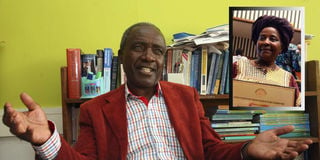Indangasi article about Micere Mugo should have been spiked

Prof Henry Indangasi during an interview at his offices in Nairobi in 2017. He has come under heavy criticism for an article he wrote on the late Prof Micere Mugo (inset).
Spiked! That’s what should have happened.
In journalism, this is the act of making sure an article doesn’t see the light of day. But instead of spiking the article, the editor hiked it to prominence.
It occupied the whole of page 2 and spilled over to one-sixth of page 3. No other single article in the paper was given as much space.
I’m talking about “Indangasi: Micere Mugo was not a deep thinker” (Saturday Nation, July 29, 2023). This is the infamous article by Henry Indangasi that said nasty things about Micere Mugo, who died on June 30 in the United States.
It claimed the celebrated Kenyan author, activist and academic “was not a deep thinker”, among other innuendos, including sexual ones.
Prof Indangasi says his article is a “biographical sketch”, but it’s more of an essay, “tell tales” ragbag. It provoked so much public anger that the Nation published another article about the anger (“Indangasi under fire over piece critical of Micere Mugo”—Daily Nation, July 31, 2023).
The Indangasi essay coincided with the memorial service to honour Prof Mugo at Syracuse University, where she was a teacher. NMG didn’t cover the service.
The essay was commissioned or submitted unsolicited. Either way, editorial gatekeeping on the essay seemingly fell apart. Gatekeeping involves evaluating articles to determine their relevance and value to audiences.
The gatekeeper, mainly the editor, may spike an article or restrain its content. He does so to reinforce editorial policy and values and meet readers expectations.
Veracity and accuracy are core values of NMG editorial policy. Editors must only publish that which they believe to be true, fair and accurate and must not run anything that is vulgar or offensive to public good taste.
“Editors must make every effort to expunge material that is vulgar or tasteless,” the policy says. Editors are also expected to refrain from publishing excessive “personality-based journalism that tends to create the impression that the issues are driven by personal agenda and vendetta”.
Prof Indangasi’s essay falls short of the policy and prevailing social norms. Numerous readers were angered by the essay.
I first became aware of the public anger at a doctor’s waiting room that Saturday morning when the essay was published. An old friend I had not seen for more than 20 years collared me. “I am very angry,” he said while fingering the Saturday Nation.
Later that day, an angry Ruth Kagia, former Deputy Chief of Staff in the Office of the President and Kenya’s Global Partnership for Education Envoy, called. “Public defender. I take exception to Indangasi’s write-up on Micere Mugo today. It was in poor taste,” she said.
The anger was all over social media and in private conversations. Wambua (https://wambuainks.wordpress.com/contact/) stood out with his detailed 1,000-word critique. He describes the Indangasi essay as a “farrago of astonishing declarations and clearly cherry-picked representations” of Prof Mugo’s persona.
Saying Prof Indangasi played “a gutter game” in which he underplayed or ignored her intellectual contributions, Wambua describes the essay as “more bile” than criticism. He describes it as “classic gossip,” “veiled reductive diatribe”, “yellow journalism” and “self-serving juicy tidbits”.
Carol Sicherman, who sent me a 300-word complaint, says: “Indangasi labels much of the commentary following her death as ‘false and factually untrue’.
He doesn’t cite a single example. Because Micere Mugo is dead, she can’t respond.... It is [saddening] that the Nation publishes articles that fall far short of its own journalistic standards. Diligent to display his knowledge, Indangasi even includes an irrelevant rumination on Robert Mugabe’s marital life.
“Indangasi chooses to highlight long-ago episodes from Mugo’s private life that ordinary decency would ignore. He reports what ‘we had heard’—i.e. gossip—about Mugo’s time in Zimbabwe. He says that she ‘spun the narrative’ of her own life story, again without evidence. This essay, with its winking insinuations and gratuitous attacks on Mugo’s friends, spins a narrative meant to assert [Indangasi’s] superiority.”
Prof Sicherman, who taught English at City University of New York and has authored two books on Ngugi wa Thiong’o, concludes: “Indangasi is incorrigible. The Nation is not. It should not carry his smears disguised as intellectual discourse.”
Too true. Prof Indangasi said things that were offensive, in bad taste and inappropriate for the occasion. And NMG gatekeepers failed readers.
The Public Editor is an independent news ombudsman who handles readers’ complaints on editorial matters including accuracy and journalistic standards. Email: [email protected]. Call or text 0721989264.





